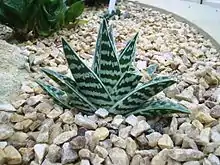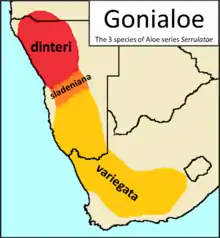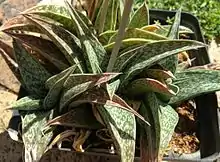Gonialoe
Gonialoe (the partridge aloes) is a small genus of three succulent plant species, indigenous to South Africa, Namibia and Angola. They were formerly included within the related genus Aloe. The three species are Gonialoe variegata, Gonialoe sladeniana, Gonialoe dinteri.[1]
| Gonialoe | |
|---|---|
 | |
| Gonialoe variegata | |
| Scientific classification | |
| Kingdom: | Plantae |
| Clade: | Tracheophytes |
| Clade: | Angiosperms |
| Clade: | Monocots |
| Order: | Asparagales |
| Family: | Asphodelaceae |
| Subfamily: | Asphodeloideae |
| Tribe: | Aloeae |
| Genus: | Gonialoe (Baker) Boatwr. & J.C.Manning |
| Type species | |
| Gonialoe variegata (L.) Boatwr. & J.C.Manning | |
| Species | |
 | |
| Distribution map of the three Gonialoe species. G. dinteri G. sladeniana G. variegata | |
Taxonomy
The genus Aloe was found to be polyphyletic. It was accordingly divided into different genera: Aloe, Kumara, Aloiampelos, and Gonialoe among others. Several recent phylogenetic studies have confirmed this division, and shown that Aloe actually comprises several relatively unrelated groups.
The same studies suggested that the closest relatives of this proposed genus were the related genus Astroloba and Tulista.[2]
Species
The three species of this genus can easily be recognised by their compact, triangular leaves forming three ranks (trifarious).
| Image | Scientific name | Distribution |
|---|---|---|
 | Gonialoe dinteri (A.Berger) Boatwr. & J.C.Manning | Namibia |
 | Gonialoe sladeniana (Pole-Evans) Boatwr. & J.C.Manning | central Namibia, south-west of Windhoek |
 | Gonialoe variegata (L.) Boatwr. & J.C.Manning | South Africa (Western Cape, Eastern Cape, Northern Cape and Free State.) |
References
- "Gonialoe (Baker) Boatwr. & J.C.Manning | Plants of the World Online | Kew Science". powo.science.kew.org. Retrieved 2017-09-15.
- Manning, John; Boatwright, James S.; Daru, Barnabas H.; Maurin, Olivier; van der Bank, Michelle. A Molecular Phylogeny and Generic Classification of Asphodelaceae subfamily Alooideae: A Final Resolution of the Prickly Issue of Polyphyly in the Alooids? Systematic Botany, Volume 39, Number 1, March 2014, pp. 55-74